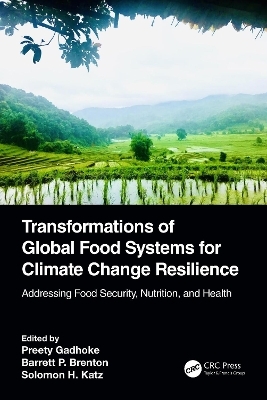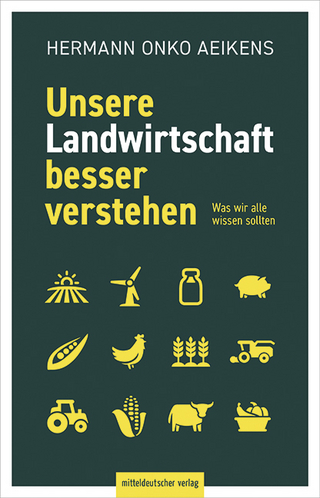
Transformations of Global Food Systems for Climate Change Resilience
CRC Press (Verlag)
978-0-367-85762-2 (ISBN)
Transformations of Global Food Systems for Climate Change Resilience: Addressing Food Security, Nutrition, and Health provides poignant case studies of climate change resilience frameworks for nutrition-focused transformations of agriculture and food systems, food security, food sovereignty, and population health of underserved and marginalized communities from across the globe. Each chapter is drawn from diverse cultural contexts and geographic areas, addressing local challenges of ongoing food and health system transformations and illustrating forms of resistance, resilience, and adaptations of food systems to climate change.
Fourteen chapters present global case studies, which directly address the United Nations Sustainable Development Goals and the Food and Agriculture Organization’s global call to action for transforming agriculture, addressing food security and nutrition, and the health of populations impacted by climate change and public health issues.They also integrate reflections, insights, and experiences resulting from the COVID-19 Pandemic.
This edited volume includes research on (1) enhancing food sovereignty and food security for underserved populations with a particular focus on indigenous peoples; (2) improving locally contextualized definitions and measurements of climate change resilience, food security, hunger, nutrition, and health; (3) informing public health programs and policies for population health and nutrition; and (4) facilitating public and policy discourse on sustainable futures for community health and nutrition in the face of climate change and natural disasters, including ongoing and future pandemics or emergencies.
Within this book, readers discover an array of approaches by the authors that exemplify the mutually engaged and reciprocal partnerships that are community-driven and support the positive transformation of the people with whom they work. By doing so, this book informs and drives a global sustainable future of scholarship and policy that is tied to the intersectionality and synergisms of climate change resilience, food security, food sovereignty, nutrition, and community health.
Preety Gadhoke, PhD, MPH, at the beginning of this project, was an Associate Professor in the College of Pharmacy and Health Sciences at St. John’s University in New York City. She is currently an independent scholar with expertise in interdisciplinary, community-based, multi-level programs and policies that address social determinants of health and health equity for marginalized populations. She has worked on public health programs with Indigenous and urban communities in North America (Native Americans/Alaska Natives, Baltimore, New York, Chicago), South America (Ecuador), Asia (Thailand), and Africa (Ghana, Nigeria, Mozambique). Dr. Gadhoke is the recipient of the 2020 Fulbright Global Research Fellowship and 2019 Catholic Relief Services Global Health Research Award. In her academic career, she has served the scientific community with the American Anthropology Association (AAA), Agriculture, Food, and Human Values Society, and Society for Applied Anthropology, American Public Health Association, and an appointed member of AAA’s Presidential Task Force on World Food Problems. At St. John’s University, she served as an Interim Director of the Master of Public Health Program and mentor for the Ozanam Scholars program, McNair Scholars program, Master of Arts degree program in Global Development and Social Justice, and Senior Fellow, Vincentian Center for Church and Society. Dr. Gadhoke is extensively published in public health and anthropology, presented numerous papers at international and national scientific conferences, and served as a reviewer for multiple journals. She brings cross-cutting perspectives to academia from multilateral, governmental, and industry work experiences. Her passion about addressing the social ecology of food systems, nutrition, and disease prevention stems from her early memories of health disparities that she witnessed as a child within her East and West Indian communities. Dr. Gadhoke earned her PhD in International Health from The Johns Hopkins Bloomberg School of Public Health, MPH in Health Policy and Management from Emory University Rollins School of Public Health, and a BA in Biology and Sociology/Anthropology at Knox College. Barrett P. Brenton, PhD, currently serves as Faculty Engagement Associate for Binghamton University’s Center for Civic Engagement where he facilitates linking faculty with community-engaged teaching and research opportunities locally and abroad. He is also an Affiliated Senior Research Scholar with the Binghamton University Anthropology Department. Dr. Brenton is a retired Professor of Anthropology from St. John’s University, New York, where he served as the Director of the Center for Global Development and MA in Global Development and Social Justice; Coordinator of the Anthropology program; Faculty Advisor for the Ozanam Scholars Social Justice program; and Senior Fellow, Vincentian Center for Church and Society. Previously, he served as: President of the Society for the Anthropology of Food and Nutrition, and of the Northeastern Anthropological Association; former Co-Editor of the International Journal Ecology of Food and Nutrition; elected to the status of Fellow of The Society for Applied Anthropology; and appointed as a member of the AAA’s Presidential Task Force on World Food Problems. As a specialist on the anthropology of sustainable food systems, nutrition. health, climate change and environmental justice, his cross-cultural and applied fieldwork experience has focused on engagement with Indigenous communities in North America, South American, and Sub-Saharan Africa, and in urban NYC and Upstate NY rural underserved communities. In addition to numerous papers presented at national and international conferences, he has an extensive publication record in the areas of food security, nutrition, health disparities and sustainable global development. Dr. Brenton’s commitment to creating sustainable and resilient food systems to climate change through food justice and food sovereignty advocacy stems from his experience of working and growing up in rural farming communities in Iowa and Nebraska. He earned his PhD in Biocultural anthropology from the University of Massachusetts-Amherst with a focus on nutritional/medical anthropology, and BA in Anthropology from the University of Nebraska-Lincoln. Solomon H. Katz, PhD, is Director of the Krogman Center for Research in Child Growth and Development, Professor of Physical Anthropology, and Professor Emeritus of Orthodontics at the University of Pennsylvania. He has written, presented and organized symposia resulting in over 200 major papers, books, and chapters lined to global field studies on diet and physical and mental health, neuroendocrinology, epidemiology of health problems in children, and the evolution of cuisine and nutrition practices, molecular biology and genetics, and cybernetics and biocultural evolution. He has also been involved in hundreds of newspaper, magazine, radio and TV reports concerned with translating science to the public. Dr. Katz is the recipient of many awards and grants from the National Institutes of Health, National Science Foundation, MacArthur Foundation, Smithsonian Institution, Kellogg Foundation, and John Templeton Foundation. He is an elected fellow, and has served as an officer and president, at many professional organizations. He serves as Chair of the American Anthropological Association (AAA) Task Force on World Food Problems that addresses contemporary global food resources and security. He also serves as president of the "World Food Observatory," dedicated to promoting education, research and enlightenment on the history, understanding, beliefs, values and appreciation of food, nutrition and diet throughout the world. Previously, Dr. Katz served as Founder and Chairman of the AAA Task Force on African Famine. He also chaired the task force that redefined the UNESCO statement on race for the American Association of Physical Anthropologists, and the International Union of Anthropological and Ethnological Sciences, a division of UNESCO. Dr. Katz was Series Editor of "Food and Nutrition in History and Anthropology" Gordon and Breach Publishers (with a dozen books in the series) and was Editor-in-Chief of the three volume "Encyclopedia of Food and Culture" published by Scribners (Gale) which was awarded six major national and international awards and prizes.
Chapter 1
Addressing Food Security, Nutrition, and Health of Local Communities for Climate Change Resilience
Barrett P. Brenton and Preety Gadhoke
Chapter 2
Climate Change Resilient Livelihoods and Adaptive Strategies among the Ju/’hoansi San of Nyae Nyae, Namibia
Robert K. Hitchcock
Chapter 3
Tribal Sovereignty and the Transformation of Food: Strategies and Practices in Upper Midwest Indigenous Communities
Cora Bender
Chapter 4
“How Decolonized Are We?” The Colonial Legacy of Commodity Foods and Food Insecurity Expressed by the Voices of Southwestern Native American Chefs
Jacquelyn N. Heuer
Chapter 5
Food Insecurity and Resilience in a Rapidly Warming Arctic
Don Callaway
Chapter 6
Food Sovereignty for Food Security, Nutrition and Climate Resilience: How Food Security has Failed Haiti, and Why Peasants Want Food Sovereignty
Marylynn Steckley and Joshua Steckley
Chapter 7
Constraints on Family Poultry Systems in Guatemala
Amy E Snively-Martinez and Marsha Quinlan
Chapter 8
Community-led Change: Building Food Security, Gender Equity and Climate Change Resilience in the Dry Corridor of Guatemala
Devon Wilson
Chapter 9
Food Security and the Viability of Yucatec Maya Sustainable Traditional Subsistence Strategies
Allison L. Hopkins, Cerian Gibbes, Armando F. Inurreta Díaz, Diana Pastrana Cervantes, Katia Rodríguez Ruz, Casandra Owens, Dalia Rawandoozi, and Juan Jiménez-Osornio
Chapter 10
Agrochemicals, Health, and Environment on the Coast of Oaxaca: The Role of Agriculture in Climate Change
Anna Batet Figueras
Chapter 11
Decolonizing Puerto Rico’s Foodscape
Adriana Garriga-Lopez and Shir Lerman Ginzburg
Chapter 12
Rooftop farming: A sustainable food production initiative in Cairo, Egypt
Mahmoud Shaltout, Martina Jaskolski, and Kara Hoving
Chapter 13
The Bee City Movement
Jennifer Marshman
Chapter 14
Walking the Middle Path of Food Sovereignty, Food Security, Nutrition, and Health in Chiang Mai Province, Thailand
Preety Gadhoke
| Erscheinungsdatum | 24.08.2023 |
|---|---|
| Zusatzinfo | 11 Tables, black and white; 7 Line drawings, black and white; 27 Halftones, black and white; 34 Illustrations, black and white |
| Verlagsort | London |
| Sprache | englisch |
| Maße | 156 x 234 mm |
| Gewicht | 449 g |
| Themenwelt | Naturwissenschaften ► Biologie |
| Weitere Fachgebiete ► Land- / Forstwirtschaft / Fischerei | |
| ISBN-10 | 0-367-85762-6 / 0367857626 |
| ISBN-13 | 978-0-367-85762-2 / 9780367857622 |
| Zustand | Neuware |
| Haben Sie eine Frage zum Produkt? |
aus dem Bereich


